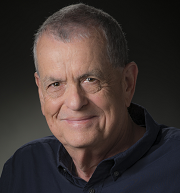Aaron Ciechanover

Aaron Ciechanover
2004 Nobel Prize in Chemistry
Proteins are in all living things, from plants to animals and humans, but they are sensitive to irradiation, mutations and temperature, and must be replaced. They also have to be removed when they have fulfilled their function and are no longer necessary.
Although researchers had figured out how cells produce various proteins, the mechanism to remove and recycle them was unknown. Professor Aaron Ciechanover, along with Profs Avram Hershko and Irwin Rose, discovered that a small protein called ubiquitin marks old proteins for destruction.
For their seminal work, Prof Ciechanover and his colleagues were awarded the Nobel Prize in Chemistry in 2004. Prof Ciechanover, who is Israel’s first Nobel Laureate in science along with Prof Hershko, noted: “The protein recycling mechanism is as novel as it is specific. It removes only damaged proteins and those that are not needed anymore, sparing all remaining ones.”
A physician by training, Prof Ciechanover has continued to study the link between ubiquitin and diseases such as cancer and neurodegenerative diseases. He is currently the Technion Distinguished Research Professor in the Technion-Israel Institute of Technology’s Faculty of Medicine.
In cancer, he is trying to manipulate the ubiquitin system so that it helps to suppress tumours. “Cancer cells have high nutrient demands. We are developing a drug to tweak the ubiquitin system, alter the environment in which the cancer cells are growing, so that the system stops providing cancer cells with nutrients,” he explained.
Prof Ciechanover is also a member of many scientific academies, including the Israel National Academy of Sciences and Humanities, European Molecular Biology Organisation, American Academy of Arts and Sciences (as a Foreign Fellow), Chinese Academy of Sciences (as a Foreign Member) and Pontifical Academy of Sciences at the Vatican.
Apart from the Nobel Prize, his awards include the 2000 Albert Lasker Award, 2002 EMET Prize, 2003 Israel Prize for Biology and 2006 Sir Hans Krebs Medal.
He wants young scientists to realise that they can make a difference in science and society. He said: “Scientific achievements are not made by magicians, but by people like you and me. We can all make discoveries that are beneficial to society. If I could do it, there is no doubt that you can do it, and do it even better.”

